You found our list of the best supply chain management books.
Supply chain management books are publications that guide readers on the physical distribution of goods to final consumers. Examples include The Supply Chain Revolution by Suman Sarkar and Logistics Clusters by Yossi Sheffi. The purpose of these books is to help supply chain professionals improve their understanding of the complex nature of supply chain management. These publications also provide information on the key factors that impact supply chain performance.
These examples are similar to business books, E-commerce books, and operations management books.
This list includes:
- supply chain management books for beginners
- logistics and supply chain management books
- global supply chain management books
Here we go!
List of supply chain management books
Supply management books are essential resources for individuals looking to improve their understanding of the supply chain and its role in business success. From The Logistics and Supply Chain Toolkit by Gwynne Richards and Essentials of Supply Chain Management, here is a list of publications that contain handy tips on supply chain management.
1. The Goal: A Process of Ongoing Improvement by Eliyahu M. Goldratt and Jeff Cox
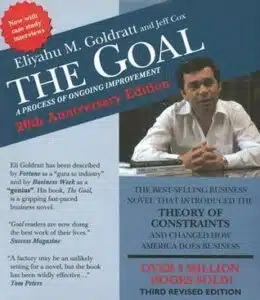
With phenomenal explanations of operations management theory and constraints, The Goal is great for individuals looking for logistics and supply chain management books. Authored in 1984, the business classic remains relevant in tackling supply chain management constraints for businesses today. Albeit a fictional read, Eliyahu M. Goldratt and Jeff Cox use real-life examples to address the weaknesses of using traditional cost accounting systems. The authors use the story of Alex as he fights to save his plant. The publication emphasizes the importance of systems in managing complex operations. For individuals in process improvement in industries like distribution, retail, manufacturing, and services, The Goal is an excellent read.
Notable quote: “Since the strength of the chain is determined by the weakest link, then the first step to improve an organization must be to identify the weakest link.”
Read The Goal.
2. The Supply Chain Revolution: Innovative Sourcing and Logistics for a Fiercely Competitive World by Suman Sarkar
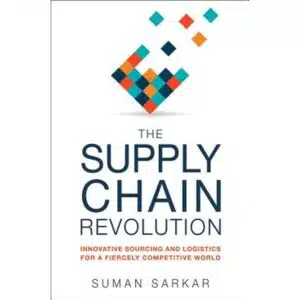
The Supply Chain Revolution discusses ways enterprises can leverage the supply chain to outperform the competition. Readers will get insights into varying supply chain management tactics that lead to the success or failure of global entities. In addition, the author highlights the importance of data analysis in supply chain management and inclusive decision-making. Sarkar uses real-life experiences and statistics from companies like Zara, IBM, HP, and Walmart to provide insights and recommendations. The Supply Chain Revolution is an excellent read for procurement, sourcing, and supply chain leaders.
Notable quote: “A better way to measure customer service is by focusing on the loyalty of the customer base, that is, money spent by existing customers or renewal of membership.”
Read The Supply Chain Revolution.
Get our free team building toolbox
- icebreaker games
- bingo cards
- DIY guides
 by teams at FedEx, Amazon, Deloitte and 73,930+ others
by teams at FedEx, Amazon, Deloitte and 73,930+ others

3. The Toyota Way: 14 Management Principles from the World’s Greatest Manufacturer by Jeffrey K. Liker

The Toyota Way tops the list of global supply chain management books. Jeffrey K. Liker uses Toyota, a multinational automotive manufacturer, to provide practical and tactical supply chain management tips. Liker argues that new enterprises should first have a manual process that will pinpoint areas that require automation. The author covers some supply chain management areas, including overproduction leading to excess inventory and capital and labor management. Other notable lessons from The Toyota Way are the importance of improving processes bit by bit, delegation, and employee involvement. Besides automobile production, the book is a handy guide for businesses in diverse industries, including software development.
Notable quote: “Continuous improvement depends on a different paradigm of the role of the human—all humans are problem detectors and problem correctors—thinking scientifically.”
Read The Toyota Way.
4. Lean Supply Chain and Logistics Management by Paul Myerson
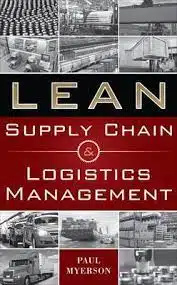
Lean Supply Chain and Logistics Management exposes the challenges that businesses experience in streamlining operations. Using real-world examples and case studies, Paul Myerson provides readers with basic and advanced lean tools and implementation opportunities. The author covers opportunity assessment, the eight wastes, value stream mapping, and metrics and measurement. The read can help enterprises cut costs and boost profits by eliminating waste in supply chain and logistics functions.
Notable quote: “In the United States, the more common way to initiate change has been to have consultants come in who borrow your watch to tell you what time it is.”
Read Lean Supply Chain and Logistics Management.
5. Logistics Clusters: Delivering Value and Driving Growth by Yossi Sheffi

Logistics Clusters seeks to explain supply chain issues across the world. Yossi Sheffi discusses why cities like Singapore, Los Angeles, and Memphis successfully develop logistical clusters, unlike other regions. The author urges businesses to locate their distributional functions in logistics clusters. The publication also highlights the role of governments in logistics in terms of regulation, investments, and trade policy. Featuring real-world cases, business leaders who want to build their global supply chains will also get valuable insights. For instance, the author talks about the role of supply chains in job creation, capital investments, and strengthening competitive positions. The book is great for readers searching for logistics and supply chain management books.
Notable quote: “Shippers and logistics service providers impose multiple requirements on their transportation carriers regardless of the product shipped. These include low and predictable price; short and consistent travel times; high departure and arrival frequency; high equipment availability; accurate and damage-free delivery; and ease of doing business with the carriers.”
Read Logistics Clusters.
6. Lean Thinking: Banish Waste and Create Wealth in Your Corporation by James P. Womack and Daniel T. Jones
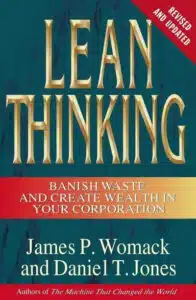
Authored by two renowned management analysts, Lean Thinking is a top choice of supply chain management books. The authors describe a business model based on the Toyota lean model. The strategy combines value-based systems and operational excellence to produce steady growth despite harsh economic conditions. This system is opposite to the crash-and-burn performance prevalent in the 1990s. The publication profiles diverse companies that experience slow but steady growth, such as Porsche and Pratt & Whitney. The authors argue that successful businesses do not focus on the constant reinvention of the business model. Rather, these entities rely on what is valuable to the consumer, followed by a speedy cycle of improvements. Lean Thinking also touches on tactics enterprises can use to avoid waste in silos, batching, and queuing.
Notable quote: “How can performance be improved? Sweat and longer hours are not the answer but will be employed if no one knows how to work smarter.”
Read Lean Thinking.
7. Bricks Matter: The Role of Supply Chains in Building Market-Driven Differentiation by Lora M. Cecere and Charles W. Chase
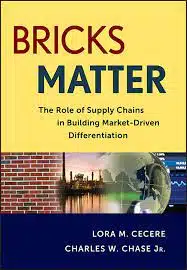
Bricks Matter guides individuals in building market-driven supply chain management structures. Lola M. Cecere and Charles W. Chase argue that supply chain management systems no longer rely on a supply-driven focus. Rather, these systems should focus on a demand-driven structure for the coexistence of demand and supply. The book provides insights to help businesses identify and turn market risks and opportunities into winning tactics. In addition, Bricks Matter includes business cases that illustrate the market-driven approach. Through these tactics, entities can maintain excellent customer service and increase market share.
Notable quote: “The term supply chain is not new. It is fundamental to military strategy. It was the difference between winning and losing in the Napoleonic wars and the Battle of the Bulge in World War II.”
Read Bricks Matter.
8. The Logistics and Supply Chain Toolkit: Over 90 Tools for Transport, Warehousing and Inventory Management by Gwynne Richards and Susan Grinsted
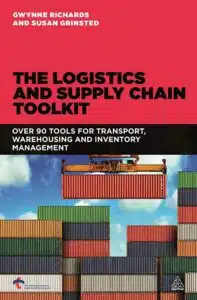
The Logistics and Supply Chain Toolkit is a great pick of supply chain management books for beginners. The resource contains a comprehensive set of tools that are pivotal for enterprises that want to drive business success and efficiency. Gwynne Richards and Susan Grinsted offer reliable advice through resources such as SWOT analysis, cause and effect analysis, and Gantt charts. The book is a handy guide for professionals in the distribution and logistics field.
Notable quote: “Inventory turnover ratio: A low number here may indicate that either your stock is slow-moving or that there may be problems, such as the presence of obsolete stock or low customer demand or order quantities are too high for the demand, resulting in little or no movement.”
Read The Logistics and Supply Chain Toolkit.
9. Total Value Optimization: Transforming Your Global Supply Chain Into a Competitive Weapon by Steven J. Bowen
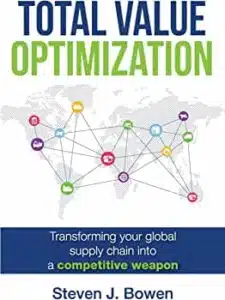
Total Value Optimization provides insights into how businesses achieve a competitive advantage in the market. Steve J. Bowen recognizes that the current corporate environment pressures leaders to deliver fast and lasting performances. Supply chains may shift with the increase in competitors, putting business growth and profitability at risk. However, Bowen argues that ventures can use a demand-driven supply chain to place customer value at the forefront. With total value optimization, businesses enjoy an assurance of thriving. Total Value Optimization discusses a framework focusing on data analytics as a competitive weapon in the ever-changing business environment. This approach can achieve supply chain excellence in procurement, logistics, and operations.
Notable quote: “Every company’s supply chain should be its ultimate competitive weapon—not the gun with which you shoot yourself in the foot.”
Read Total Value Optimization.
10. The Box: How the Shipping Container Made the World Smaller and the World Economy Bigger by Marc Levinson
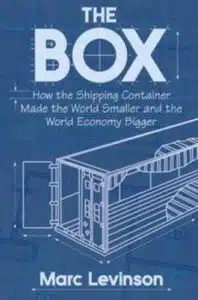
If you want to learn about the history of shipping, then The Box is a great resource. Marc Levinson talks about the beginning of shipping containers in 1956. The author then discusses container shipping development resulting in a global trade boom. The publication contains riveting details about how Malcolm McLean, a critical businessman, turned containerization into a remarkable industry. The Box also details the logistical struggles of businesses before the adoption of the shipping container. Readers will also get insights into the economic disadvantages of this innovation. For instance, the author shares how the container elevates Asia to a global workshop and the access of affordable products to consumers worldwide.
Notable quote: “The economic benefits arise not from innovation itself, but from the entrepreneurs who eventually discover ways to put innovations to practical use.”
Read The Box.
11. Arriving Today: From Factory to Front Door—Why Everything Has Changed About How and What We Buy by Christopher Mims
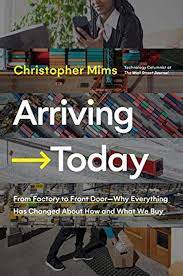
If you want to learn the product journey from the factory to consumers’ doorstep, then Arriving Today is a great read. Christopher Mims analyzes different management strategies and technologies that facilitate the timely fulfillment of consumer demands. The author also uncovers shifts in human labor practices in the world’s busiest ports and automated warehouses. Readers will gain insights into how the promise of arriving today shifts the balance between humans and machinery. The author also touches on all individuals involved in the process, including local drivers, dock workers, cargo ship workers, and truckers. Mims argues that these large-scale innovations can be inspiring, horrifying, and enlightening. Arriving Today also provides a glimpse into the future of fully automated systems.
Notable quote: ”This is one reason shipping container architecture, far from being some kind of Earth-friendly ‘recycling,’ is in many cases an absurd vanity: stripping away all that nasty stuff takes more time, money, and energy than building a comparable structure anew.”
Read Arriving Today.
12. Essentials of Supply Chain Management by Michael H. Hugos
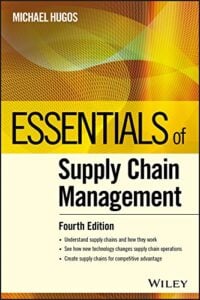
Essentials of Supply Chain Management is an exceptional pick of global supply chain management books. Michael Hugos focuses on helping businesses maximize profitability by streamlining supply chain efficiency. The author takes readers through the analysis of well-designed supply chains and explains the performance measuring metrics. Hugos also includes thorough instructions for creating e-commerce businesses, from idea creation to implementation. The author provides handy tips for entities that want to improve the management of their supplies through his experience working with companies such as Starbucks and Johnson Wax.
Notable quote: “He envisions the supply chain as an intricate network of suppliers, distributors, and customers who share carefully managed information about demand, decisions, and performance, and who recognize that success for one part of the supply chain means success for all.”
Read Essentials of Supply Chain Management.
13. Critical Chain by Eliyahu M. Goldratt
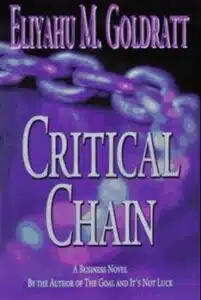
Critical Chain provokes businesspeople to examine and address business practices. The publication covers various topics, such as tactics to create safety buffers, estimation fallacies, and optimizing lead times. While Critical Chain mainly focuses on project management, individuals will also learn how to optimize their supply chain management. The book is excellent for business professionals in operations, supply chain management, process involvement, and production.
Notable quote: “Too many wasteful ‘synchronization’ meetings interrupted the actual work.”
Read Critical Chain.
14. The Fifth Discipline: The Art & Practice of The Learning Organization by Peter M. Senge
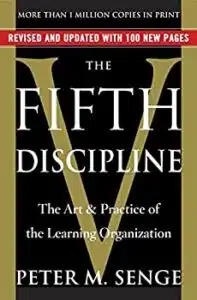
For supply chains to be effective, organizations must learn how to eliminate learning blocks that threaten success. The Fifth Business demonstrates how entities can adopt strategies that will foster new and expansive thinking patterns and create desirable results. Peter M. Senge outlines different disciplines, such as reigniting a genuine spark to learn and bridge teamwork into macro activity. The author also provides problem-solving tips using the systems-thinking method. The Fifth Discipline has methods and theories pivotal in understanding complexity.
Notable quote: “The practice of shared vision involves the skills of unearthing shared ‘pictures of the future’ that foster genuine commitment and enrollment rather than compliance. In mastering this discipline, leaders learn the counter productiveness of trying to dictate a vision, no matter how heartfelt.”
Read The Fifth Discipline.
15. Supply Chain Management For Dummies by Daniel Stanton
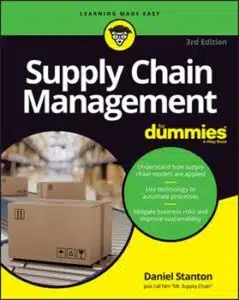
If you are searching for supply chain management books for beginners, then Supply Chain Management For Dummies is a good bet. The author argues that every individual can impact the supply chain. The book helps readers pinpoint the connection between operations, purchases, and operations and see how a simple oversight can affect the bigger picture. Daniel Stanton focuses on the Supply Chain Operations Reference model that applies to diverse businesses. The model gives readers insights into the best practices for planning, sourcing, making, delivering, returning, and enabling processes.
Notable quote: “Demand shaping gives you more control of the delicate balance between supply and demand.”
Read Supply Chain Management For Dummies.
Conclusion
Supply chain management books play a critical role in the success of any business that seeks to optimize its supply chain. These books provide insights into the best sourcing, procurement, inventory management, and logistics practices. These publications can help supply chain professionals to stay up to date with the latest trends and best practices in the field and apply this knowledge to their daily work. Additionally, supply chain management books are a valuable resource for students pursuing a career in the field. The publications provide a solid foundation of knowledge that can help individuals succeed in their studies and future careers.
Next, check out our list of business strategy books, customer experience books, office management books, and change management books.




